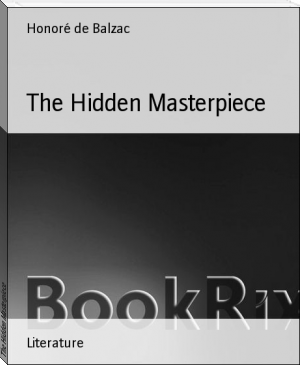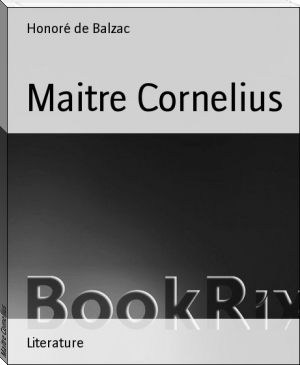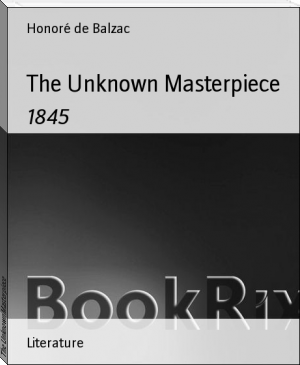The Hidden Masterpiece by Honoré de Balzac (diy ebook reader .TXT) 📖

- Author: Honoré de Balzac
Book online «The Hidden Masterpiece by Honoré de Balzac (diy ebook reader .TXT) 📖». Author Honoré de Balzac
"Well," returned Porbus, "then let us say no more. But before you find, even in Asia, a woman as beautiful, as perfect, as the one I speak of, you may be dead, and your picture forever unfinished."
"Oh, it is finished!" said Frenhofer. "Whoever sees it will find a woman lying on a velvet bed, beneath curtains; perfumes are exhaling from a golden tripod by her side: he will be tempted to take the tassels of the cord that holds back the curtain; he will think he sees the bosom of Catherine Lescaut,--a model called the Beautiful Nut-girl; he will see it rise and fall with the movement of her breathing. Yet--I wish I could be sure--"
"Go to Asia, then," said Porbus hastily, fancying he saw some hesitation in the old man's eye.
Porbus made a few steps towards the door of the room. At this moment Gillette and Nicolas Poussin reached the entrance of the house. As the young girl was about to enter, she dropped the arm of her lover and shrank back as if overcome by a presentiment. "What am I doing here?" she said to Poussin, in a deep voice, looking at him fixedly.
"Gillette, I leave you mistress of your actions; I will obey your will. You are my conscience, my glory. Come home; I shall be happy, perhaps, if you, yourself--"
"Have I a self when you speak thus to me? Oh, no! I am but a child. Come," she continued, seeming to make a violent effort. "If our love perishes, if I put into my heart a long regret, thy fame shall be the guerdon of my obedience to thy will. Let us enter. I may yet live again,--a memory on thy palette."
Opening the door of the house the two lovers met Porbus coming out. Astonished at the beauty of the young girl, whose eyes were still wet with tears, he caught her all trembling by the hand and led her to the old master.
"There!" he cried; "is she not worth all the masterpieces in the world?"
Frenhofer quivered. Gillette stood before him in the ingenuous, simple attitude of a young Georgian, innocent and timid, captured by brigands and offered to a slave-merchant. A modest blush suffused her cheeks, her eyes were lowered, her hands hung at her sides, strength seemed to abandon her, and her tears protested against the violence done to her purity. Poussin cursed himself, and repented of his folly in bringing this treasure from their peaceful garret. Once more he became a lover rather than an artist; scruples convulsed his heart as he saw the eye of the old painter regain its youth and, with the artist's habit, disrobe as it were the beauteous form of the young girl. He was seized with the jealous frenzy of a true lover.
"Gillette!" he cried; "let us go."
At this cry, with its accent of love, his mistress raised her eyes joyfully and looked at him; then she ran into his arms.
"Ah! you love me still?" she whispered, bursting into tears.
Though she had had strength to hide her suffering, she had none to hide her joy.
"Let me have her for one moment," exclaimed the old master, "and you shall compare her with my Catherine. Yes, yes; I consent!"
There was love in the cry of Frenhofer as in that of Poussin, mingled with jealous coquetry on behalf of his semblance of a woman; he seemed to revel in the triumph which the beauty of his virgin was about to win over the beauty of the living woman.
"Do not let him retract," cried Porbus, striking Poussin on the shoulder. "The fruits of love wither in a day; those of art are immortal."
"Can it be," said Gillette, looking steadily at Poussin and at Porbus, "that I am nothing more than a woman to him?"
She raised her head proudly; and as she glanced at Frenhofer with flashing eyes she saw her lover gazing once more at the picture he had formerly taken for a Giorgione.
"Ah!" she cried, "let us go in; he never looked at me like that!"
"Old man!" said Poussin, roused from his meditation by Gillette's voice, "see this sword. I will plunge it into your heart at the first cry of that young girl. I will set fire to your house, and no one shall escape from it. Do you understand me?"
His look was gloomy and the tones of his voice were terrible. His attitude, and above all the gesture with which he laid his hand upon the weapon, comforted the poor girl, who half forgave him for thus sacrificing her to his art and to his hopes of a glorious future.
Porbus and Poussin remained outside the closed door of the atelier, looking at one another in silence. At first the painter of the Egyptian Mary uttered a few exclamations: "Ah, she unclothes herself!"--"He tells her to stand in the light!"--"He compares them!" but he grew silent as he watched the mournful face of the young man; for though old painters have none of such petty scruples in presence of their art, yet they admire them in others, when they are fresh and pleasing. The young man held his hand on his sword, and his ear seemed glued to the panel of the door. Both men, standing darkly in the shadow, looked like conspirators waiting the hour to strike a tyrant.
"Come in! come in!" cried the old man, beaming with happiness. "My work is perfect; I can show it now with pride. Never shall painter, brushes, colors, canvas, light, produce the rival of Catherine Lescaut, the Beautiful Nut-girl."
Porbus and Poussin, seized with wild curiosity, rushed into the middle of a vast atelier filled with dust, where everything lay in disorder, and where they saw a few paintings hanging here and there upon the walls. They stopped before the figure of a woman, life-sized and half nude, which filled them with eager admiration.
"Do not look at that," said Frenhofer, "it is only a daub which I made to study a pose; it is worth nothing. Those are my errors," he added, waving his hand towards the enchanting compositions on the walls around them.
At these words Porbus and Poussin, amazed at the disdain which the master showed for such marvels of art, looked about them for the secret treasure, but could see it nowhere.
"There it is!" said the old man, whose hair fell in disorder about his face, which was scarlet with supernatural excitement. His eyes sparkled, and his breast heaved like that of a young man beside himself with love.
"Ah!" he cried, "did you not expect such perfection? You stand before a woman, and you are looking for a picture! There are such depths on that canvas, the air within it is so true, that you are unable to distinguish it from the air you breathe. Where is art? Departed, vanished! Here is the form itself of a young girl. Have I not caught the color, the very life of the line which seems to terminate the body? The same phenomenon which we notice around fishes in the water is also about objects which float in air. See how these outlines spring forth from the background. Do you not feel that you could pass your hand behind those shoulders? For seven years have I studied these effects of light coupled with form. That hair,--is it not bathed in light? Why, she breathes! That bosom,--see! Ah! who would not worship it on bended knee? The flesh palpitates! Wait, she is about to rise; wait!"
"Can you see anything?" whispered Poussin to Porbus.
"Nothing. Can you?"
"No."
The two painters drew back, leaving the old man absorbed in ecstasy, and tried to see if the light, falling plumb upon the canvas at which he pointed, had neutralized all effects. They examined the picture, moving from right to left, standing directly before it, bending, swaying, rising by turns.
"Yes, yes; it is really a canvas," cried Frenhofer, mistaking the purpose of their examination. "See, here is the frame, the easel; these are my colors, my brushes." And he caught up a brush which he held out to them with a naive motion.
"The old rogue is making game of us," said Poussin, coming close to the pretended picture. "I can see nothing here but a mass of confused color, crossed by a multitude of eccentric lines, making a sort of painted wall."
"We are mistaken. See!" returned Porbus.
Coming nearer, they perceived in a corner of the canvas the point of a naked foot, which came forth from the chaos of colors, tones, shadows hazy and undefined, misty and without form,--an enchanting foot, a living foot. They stood lost in admiration before this glorious fragment breaking forth from the incredible, slow, progressive destruction around it. The foot seemed to them like the torso of some Grecian Venus, brought to light amid the ruins of a burned city.
"There is a woman beneath it all!" cried Porbus, calling Poussin's attention to the layers of color which the old painter had successively laid on, believing that he thus brought his work to perfection. The two men turned towards him with one accord, beginning to comprehend, though vaguely, the ecstasy in which he lived.
"He means it in good faith," said Porbus.
"Yes, my friend," answered the old man, rousing from his abstraction, "we need faith; faith in art. We must live with our work for years before we can produce a creation like that. Some of these shadows have cost me endless toil. See, there on her cheek, below the eyes, a faint half-shadow; if you observed it in Nature you might think it could hardly be rendered. Well, believe me, I took unheard-of pains to reproduce that effect. My dear Porbus, look attentively at my work, and you will comprehend what I have told you about the manner of treating form and outline. Look at the light on the bosom, and see how by a series of touches and higher lights firmly laid on I have managed to grasp light itself, and combine it with the dazzling whiteness of the clearer tones; and then see how, by an opposite method,--smoothing off the sharp contrasts and the texture of the color,--I have been able, by caressing the outline of my figure and veiling it with cloudy half-tints, to do away with the very idea of drawing and all other artificial means, and give to the form the aspect and roundness of Nature itself. Come nearer, and you will see the work more distinctly; if too far off it disappears. See! there, at that point, it is, I think, most remarkable." And with the end of his brush he pointed to a spot of clear light color.
Porbus struck the old man on the shoulder, turning to Poussin as he did so, and said, "Do you know that he is one of our greatest painters?"
"He is a poet even more than he is a painter," answered Poussin gravely.
"There," returned Porbus, touching the canvas, "is the ultimate end of our art on earth."
"And from thence," added Poussin, "it rises, to enter heaven."
"How much happiness is there!--upon that canvas," said Porbus.
The absorbed old man gave no heed to their words; he was smiling at his visionary woman.
"But sooner or later, he will perceive that there is nothing there," cried Poussin.
"Nothing there!--upon my canvas?" said Frenhofer, looking first at the two painters, and then at his imaginary
 Have you ever thought about what fiction is? Probably, such a question may seem surprising: and so everything is clear. Every person throughout his life has to repeatedly create the works he needs for specific purposes - statements, autobiographies, dictations - using not gypsum or clay, not musical notes, not paints, but just a word. At the same time, almost every person will be very surprised if he is told that he thereby created a work of fiction, which is very different from visual art, music and sculpture making. However, everyone understands that a student's essay or dictation is fundamentally different from novels, short stories, news that are created by professional writers. In the works of professionals there is the most important difference - excogitation. But, oddly enough, in a school literature course, you don’t realize the full power of fiction. So using our website in your free time discover fiction for yourself.
Have you ever thought about what fiction is? Probably, such a question may seem surprising: and so everything is clear. Every person throughout his life has to repeatedly create the works he needs for specific purposes - statements, autobiographies, dictations - using not gypsum or clay, not musical notes, not paints, but just a word. At the same time, almost every person will be very surprised if he is told that he thereby created a work of fiction, which is very different from visual art, music and sculpture making. However, everyone understands that a student's essay or dictation is fundamentally different from novels, short stories, news that are created by professional writers. In the works of professionals there is the most important difference - excogitation. But, oddly enough, in a school literature course, you don’t realize the full power of fiction. So using our website in your free time discover fiction for yourself. 




Comments (0)